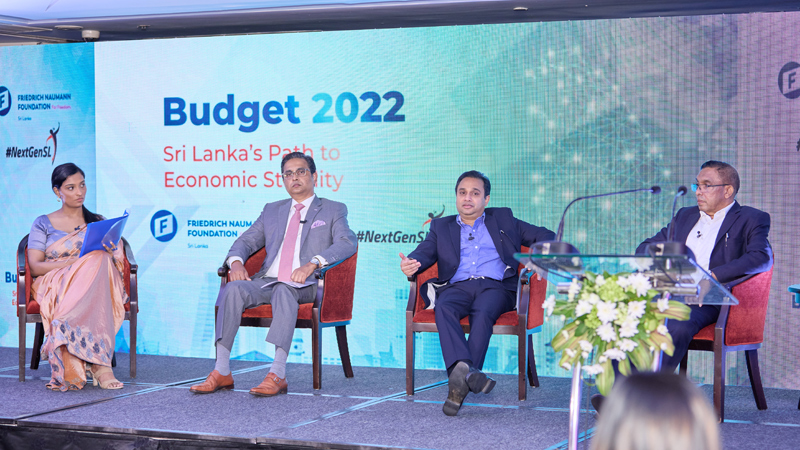Import controls ‘easy way-out’ for Sri Lanka MPs, says economist

COLOMBO: The need for multi-pronged broad reforms to stabilize the economy and to ensure long-term policy consistency were some of the key highlights at a pre-budget discussion held on Oct. 21, addressing a number of economic issues currently faced by Sri Lanka.
The discussion, titled ‘Budget 2022: Sri Lanka’s Path to Economic Stability,’ was organized by NextGenSL and the Friedrich Naumann Foundation for Freedom in Sri Lanka.
Justus Lenz, policy advisor for Economic and Financial Affairs at the Liberal Institute, the Friedrich Naumann Foundation for Freedom’s think tank, delivered the keynote speech, in which he shared Germany’s experience in economic revival with the hope of encouraging Sri Lanka to embark on broad and meaningful reforms to revive the economy.
Lenz drew attention to the fact that Germany’s success was based on four primary factors — 1) Free markets, property rights, and unregulated prices 2) The rule of law, infrastructure, and social policies provided by the state 3) Abstention from direct market interventions (mostly) and 4) Free trade and the EU’s common market.
“Actual economic growth depends entirely on entrepreneurs who develop products and services. But in order to drive development and progress, entrepreneurs need a well-functioning market order which provides freedom and security,” he said.
“Facing enormous difficulties, West Germany implemented the social market economy and placed its trust in free markets, the entrepreneurial spirit, and an open society. East Germany bet on central planning and top-down control. In the first ten or twenty years, the race to prosperity seemed to be a close one. But the long-term effects of both free and controlled markets soon became obvious,” he said.
“A lesson that can be drawn from looking at our experience in Germany is that reforms towards a free-market order can be very successful. If one pursues this direction, it is important to consider that success can take time. The implementation time can be painful and long, as seen both after 1948 and 1989.”
“Of course, there is no easy recipe for implementing a free-market order such as the Social Market Economy,” he said.
Following the keynote speech, a panel discussion featuring Prof. Sirimal Abeyratne, MP Mayantha Dissanayake, Sanjaya Mohottala, chairman, Board of Investments, and Justus Lenz took place, primarily focusing on Sri Lanka’s need for broad economic reforms.
Sathya Karunarathne of the Advocata Institute moderated the discussion.
Expressing his views at the panel discussion, Prof. Sirimal Abeyratne, a veteran economist, said that Sri Lana should move away from ad-hoc changes and work toward an overall reform package.
“Even measures such as the removal of price controls should have come as part of an overall reform package. Without such an approach, there is going to be an enormous impact on low-income groups,” he said, adding that Sri Lanka should not look for short-term solutions for long-term problems.
“Budget is a short-term policy plan which only focuses on a period of 12 months.
“But, it has to be consistent with a long-term plan. The absence of such consistency has been the problem in Sri Lanka,” he explained.
He added that it was important to understand that a budget could not grant relief without someone paying for it.
“We had the space to print money during the early stages of the pandemic.
“Now, the vaccination process has seen significant progress and Sri Lanka has done a commendable job with the vaccination drive when compared to many other developing nations.
“As a result, inflation and aggregate demand are increasing, limiting the Central Bank’s ability to finance the budget deficit,” he pointed out.
Prof. Abeyratne was also of the opinion that the current import controls were an “easy way-out” for Sri Lankan lawmakers.
“We must first understand what hinders the growth of domestic production.
“There are many factors contributing to this situation, but we brush them aside and resort to import controls because that is the easy way out. As a result, the core issues will remain the same,” he explained.
